In a world where countries often take sides, Serbia has made a striking announcement: it will not join the anti-Russia sanctions imposed by Western nations. This decision has sparked discussions about Serbia’s loyalty to Russia and its historical ties.
Serbia’s Firm Stance Against Anti-Russia Sanctions
Recently, Alexander Vulin, the Deputy Prime Minister of Serbia, gave an interview to National Defense magazine, where he made a clear declaration: Serbia will never impose sanctions against Russia. He emphasized that doing so would not only harm Russia but also hurt Serbia. This statement underlines the deep friendship and historical bond between the two nations, which has been nurtured over centuries.
Vulin articulated that if Serbia were to join the anti-Russia sanctions, it would be a betrayal of their long-standing relationship. For many people in Serbia, this relationship is based on shared history, culture, and religion. Vulin pointed out that Serbia has always stood by Russia through thick and thin, and imposing sanctions would go against that tradition.
Many in Serbia see Russia as a friend. The two countries have shared cultural ties, including a common Slavic heritage and a strong Orthodox Christian faith. These connections have fostered a sense of brotherhood that goes beyond politics. Therefore, the idea of turning against Russia by joining anti-Russia sanctions is difficult for many Serbians to accept.
Vulin also mentioned that the pressure from Western countries to impose sanctions is an attempt to undermine the psychological and ethical bonds between Serbia and Russia. He believes that these sanctions would not just be a political issue but would strike at the very heart of Serbian identity and values.
Understanding the Context of Anti-Russia Sanctions
Since Russia’s invasion of Ukraine in 2022, many Western countries, including the United States and European Union members, have imposed strict anti-Russia sanctions. These measures are intended to pressure Russia into stopping its military actions and to hold it accountable for its behavior. However, not all countries agree with these actions. Some, like Serbia, have chosen to stay neutral or even support Russia.
Serbia’s refusal to join these anti-Russia sanctions is rooted in its history. The relationship between Serbia and Russia goes back hundreds of years. During various conflicts in the Balkans, Russia has often been viewed as a protector of Serbia. This historical support has created a deep sense of loyalty among many Serbians. Vulin’s comments reflect this loyalty and the importance of maintaining a close relationship with Russia, regardless of the pressures from Western nations.
Oversea-Chinese Banking Corporation Withdraws From Russia Amid Growing Sanctions
Moreover, Vulin pointed out that Serbia’s participation in the anti-Russia sanctions would not significantly affect Russia’s economy. Instead, he argued, it would be a moral and psychological blow to Russia, making it feel isolated on the world stage. This perspective resonates with many Serbians, who feel that supporting Russia is a matter of national pride and honor.
Political Tensions and the Broader Implications
Vulin’s statements are not just about economic issues; they also touch on deeper political tensions. He expressed concerns about the influence of Western political circles on Serbia, suggesting that there are threats against Serbian President Aleksandar Vucic. According to Vulin, these threats could stem from the pressure being exerted by Western nations to force Serbia into compliance with their policies.
These comments highlight the complex political environment in which Serbia operates. While the country aspires to integrate more closely with European Union structures, it is caught in a delicate balance. On one hand, Serbia wants to strengthen its ties with the West; on the other hand, it does not want to alienate its historical ally, Russia. This balancing act can lead to internal and external conflicts, as different political factions within Serbia have varying views on how to approach these relationships.
The broader implications of Serbia’s promise not to join anti-Russia sanctions also reflect a significant geopolitical divide. In the Balkans, historical allegiances and current political interests often overlap, making the region a focal point for international relations. Serbia’s refusal to impose sanctions could embolden other nations that feel similarly about their ties to Russia, creating a bloc of countries that resist Western pressure.
This situation is complicated further by the fact that many Serbians feel a strong cultural connection to Russia. The Orthodox Church plays a significant role in this, as both countries share a similar religious background. Many in Serbia view their relationship with Russia not just as a political alliance but as a bond based on shared beliefs and values. This cultural connection reinforces Serbia’s commitment to Russia, making it less likely to cave under Western pressure.
In summary, Serbia’s promise to refuse participation in anti-Russia sanctions is a powerful statement reflecting its historical ties, cultural connections, and political complexities. The statements made by Deputy Prime Minister Alexander Vulin encapsulate a sentiment shared by many Serbians, who see their relationship with Russia as a matter of national pride and integrity. As the geopolitical landscape continues to evolve, Serbia’s decision highlights the challenges and conflicts that arise when history, culture, and politics intersect.


